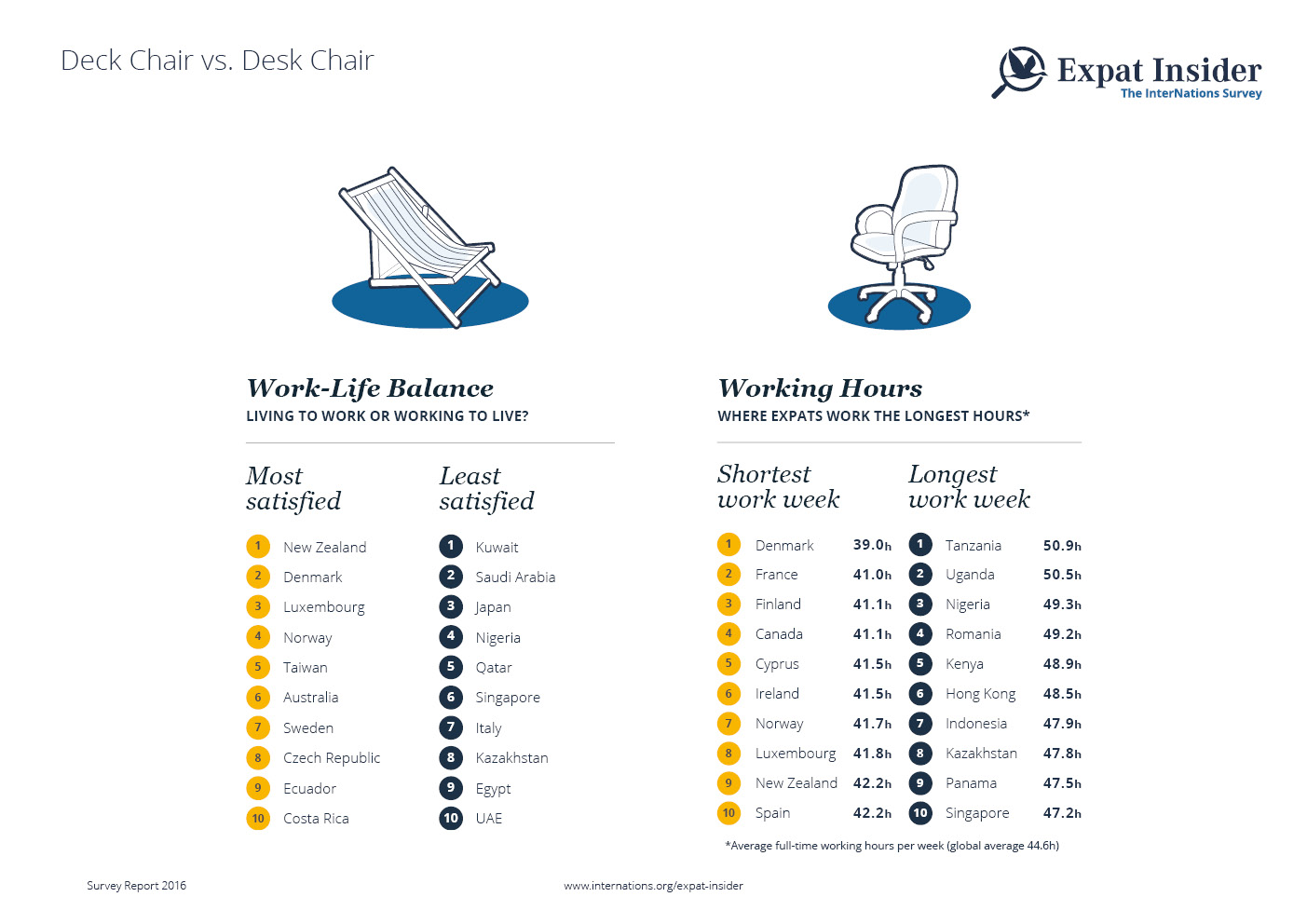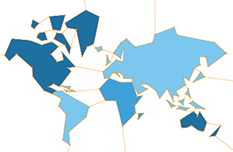Work & Leisure: Finding a Happy Medium
- Norway, Denmark, and New Zealand top the list
- Malta sees sharp drop in satisfaction with work-life balance
- Greece, Turkey, and Italy have lowest satisfaction with working hours
- Expats aged 36–40 work the most hours per week
- Men generally happier with working hours and work-life balance
The Work-Life Balance subcategory of the Working Abroad Index is made up of two questions focusing on work-life balance and working hours. In addition, expats were asked whether they work full- or part-time and how many hours they work per week.
Keeping the Right Balance
Among the rankings, there have been some big changes: Malta, for instance, has dropped from 3rd place last year in the Work-Life Balance subcategory to 20th in 2016. Meanwhile, India has climbed the ranking from last place in 2015 to 37th out of 67 countries in 2016. At the top of the subcategory are Norway, Denmark, and New Zealand.
New Zealand comes out on top in terms of work-life balance alone, beating Denmark and Luxembourg, who are in second and third place, respectively. Again, Malta has rushed down the rankings from 3rd in 2015, to 30th in 2016. In contrast, India has leapt up the list from 63rd out of 64 countries in 2015 to 46th out of 67 countries in 2016.
In terms of satisfaction with working hours, Norway is given the most favorable expat opinions, while Greece is at the bottom of the list, joined by Turkey and Italy. Clearly, expats working in India are also regarding their working hours more favorably this year: the country rises from 60th out of 64 countries in 2015 to 30th in 2016.
More Free Time in the Nordic Countries
It is perhaps interesting to note that the top two countries in the Work-Life Balance subcategory are also two of the countries with the shortest full-time working hours: Denmark has the shortest working hours with 39.0 hours per week, while expats in Norway work on average 41.7 hours per week compared to the global average of 44.6. There has, however been no proven correlation between satisfaction with work-life balance and short working hours. In fact, none of the countries in the bottom five of the Work-Life Balance subcategory are found among the five nations with the longest full-time working hours; the country with the longest full-time working hours is Tanzania with expats working 50.9 hours per week on average.
Working Hours Get Longer as You Get Older
While the over 50 age group may have the lowest average working hours (40.1 weekly), looking solely at full-time positions, it can be seen that the eldest three groups actually work the longest hours. In fact, full-time workers aged 36 and above work a weekly 45.2 hours compared to the global average of 44.6.
Regarding both full- and part-time work, those aged 36–40 work the most hours per week (42.2 compared to 41.4 globally). Perhaps this is part of the reason why they are the least satisfied with both their work-life balance and working hours, especially as they are often trying to advance their career alongside balancing family obligations. Those over 50 are, on the other hand, the most satisfied with their work-life balance and working hours, with 22% quoting complete satisfaction with both factors.
Men and Those with No Kids Work More
Not only do men tend to work more hours per week than women (43.5 vs. 39.0 hours), but they interestingly also tend to be slightly happier than women with both their work-life balance and their working hours. Women are also twice as likely to work part time. The main motivations for moving abroad perhaps explain this: women are far more likely to quote love (13% vs. 9%) or their partner’s career (14% vs. 3%) as their main reason for relocating.
Meanwhile, as would be expected, parents are a bit more likely to work part time than expats without dependent children, with parents working 0.6 hours per week less than the global average. However, in full-time positions there is no difference. It should be pointed out, though, that this varies between mothers and fathers. Mothers working full time tend to do so 0.7 hours a week less than their non-parent counterparts, while there is barely any difference for men.
What Type of Expat Is Happiest with Work-Life Balance?
The Dream Destination Expat and the Adventurer are first and second, respectively, for levels of satisfaction when it comes to both work-life balance and working hours. In fact, 24% of Dream Destination Expats are completely satisfied with their work-life balance compared to 17% globally.
It is also interesting to see the average working hours when divided by expat type. The Foreign Assignee works the most hours on average (45.9), followed by the Foreign Recruitee (44.1), and the Career Expat (43.0), all noticeably more hours per week than the global average of 41.4. In fact, when looking at just full-time positions, the hours worked by the Foreign Assignees increase to 46.5 hours per week compared to the lower end of the spectrum of the (Ex-)Student who works 42.4 hours full time.




